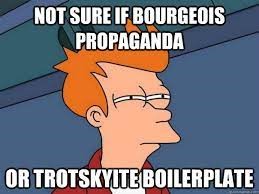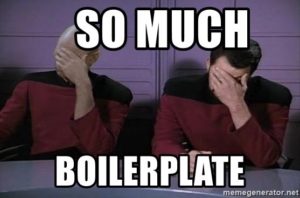Are you looking for a standard legal agreement for your business? You could say you're searching for a 'boilerplate' document. This post unpacks the meaning and origin of this expression.
Meaning
The expression 'boilerplate' refers to written copy reused in applications without the need for any significant changes to the document. 'Boilerplate' can refer to computer code, documents, contracts, statements, and T&Cs. The media will use 'boilerplate' to refer to poor-quality writing.
It's common for businesses to use boilerplate in their contracts. For instance, they may copy another company's terms and conditions. They make minor adjustments to the text to accommodate their special terms of service for the company.
In the legal industry, a boilerplate clause has the sole function of protecting the business in the event of problems with customers or industry authorities. The boilerplate text ensures that the company doesn't make mistakes that may open them to consumer liability.
Example Usage
"We need to create a disclaimer for the website and the streaming events. I need someone to look through similar boilerplate disclaimers and customize it to our company."
"It's all pretty standard boilerplate terms and conditions. There's nothing nefarious or underhanded going on here."
"I'm tired of going through this boilerplate code. I would rather be doing anything than this; I feel like it's a waste of my time and talent."
"There's no way this is custom code. It's the same boilerplate stuff I was working on last week."
"It's a standard boilerplate agreement with no shady clauses. You can read through it if you like and bring it back to me tomorrow."
"I asked for a unique document, not this boilerplate garbage. Please, bring me what I ask, or I'll have to get it from someone else."


Origin
The expression ‘boilerplate’ originates from the steam boiler and safety valve invention by Frenchman Denis Papin in 1679. Boilers were introduced to England in the early 1700s, and the industry developed the kettle-type boiler in the early 1800s.
A boilerplate refers to a steel plate used as a template in steam boiler construction. These standardized plates helped the boilermakers produce consistent results with their work. T
he term ‘boilerplate’ spread to media and the legal profession in the mid-1950s. The first use of the expression was in an article in the Bedford Gazette, criticizing boilerplates because they include fine print designed to circumvent laws.
Phrases Similar to Boilerplate
- Standardized.
- Cloned.
Phrases Opposite to Boilerplate
- Customized.
- Unique.
What is the Correct Saying?
- Boilerplate.
Ways People May Say Boilerplate Incorrectly
The phrase ‘boilerplate’ no longer refers to the traditional term referring to the construction of steam boilers. Using it to describe boiler-making activities or related tasks is incorrect.
Acceptable Ways to Phrase Boilerplate
You can use the term ‘boilerplate’ when referring to standardized contracts, statements, and code. Boilerplate also defines unoriginal or plagiarized writing. It’s more common to use ‘boilerplate’ in professional settings. For instance, your boss could ask you to prepare a boilerplate contract for a deal with a supplier at work.
There is limited use in social settings other than to describe terms and conditions or policies instituted by businesses and other organizations. For instance, you might come across boilerplate legal agreements when searching websites and signing up for mailing lists.